- Home
- V. S. Naipaul
The Mimic Men Page 2
The Mimic Men Read online
Page 2
At last we were ready. The tiny Englishman ran out to get a taxi. After a little time Lieni, now impatient, took us all out to the portico to wait. The street was already brown and squishy. But the snow still lay white on the columns of the portico, obscuring the name of the hotel. Presently the taxi came, the tiny Englishman sitting forward on the tip-up seat, overcoated and absurdly diminished but spry and restless. The church was not far. We got there at about twenty past three. We were in good time. No one was ready for us. The church had been bombed out and the christening was to take place in an annexe. We sat in an ante-room of sorts with other mothers and children and waited. Lieni was smiling all the time below her hat, the smart London girl. A baby squealed. A box of candles had a card: Candles twopence. Two young girls went to the box, dropped coppers, lit candles and fixed them in a stand. The mother of the girls looked round at us and smiled, inviting witness and approval.
At half past three an unshaven man with a dirty collar entered in a rush and said, ‘Christening?’ ‘Yes, yes,’ the mothers said. He went out again and reappeared a second later. ‘How many, how many?’ He counted the babies himself and said, ‘Three.’ He disappeared once more, returned as quickly as before, opened the door and asked us to follow him. We followed him up the stairs, candlestands all the way, candles twopence, and came into a large room with ochre walls. He took a white gown off a hook and forced himself into it. A priest came in silently, smiling. He went to a rack, picked up a purple scarf with gold crosses and arranged the scarf carefully over his shoulders. The unshaven man scuttled about, seeking the three godfathers to hand them little cards in transparent glossy sheaths. The christenings began. At last it was the turn of Lieni’s baby.
‘John Cedric, what doest thou ask of the Church? Say Faith.’
Our godfather didn’t like being told. He hunted out the response on the card he had been given. Then he said, ‘Faith.’
‘What does Faith give you? Say everlasting life.’
‘I know, father. Everlasting life.’
The priest hallowed the baby with his saliva, his thumb and his fingers. With his nose he made the sign of the cross over the baby. I believe – my memories of the ceremony are now a little vague – that at a certain stage he put a pinch of salt into the baby’s mouth. John Cedric made a sour face and worked his tongue. Through his godfather he renounced the devil and his works and accepted God instead; and presently the ceremony was over. Lieni grew grave towards the end. She was almost in tears when she went to the priest and offered money – I believe – which was rejected. No longer the smart London girl; and for the first time that afternoon I remembered that she was an unmarried mother. It was left to the tiny godfather to revive our spirits in the taxi, and even Elsa, his wife, passionately anti-clerical, agreed that it had been a beautiful ceremony of forgiveness.
There was to be a party afterwards. Lieni had invited all her friends. At about six they began arriving, some coming straight from their jobs. Lieni was in the kitchen, her afternoon grooming partly abolished by a very dirty apron. The tiny godfather acted as host in the front basement room. Several damp, macintoshed Maltese came in together and talked glumly in English and their own language. I got the impression they were talking of jobs and money and the current London prejudice that turned every Maltese into a white slaver. The Countess smiled at everyone and said little. Johnny the fascist came in with his wife. He wore his black shirt, a sign that he had been ‘working’ some district. His wife was drunk as usual. All the Maltese greeted him warmly. ‘Hi, Johnny-boy! Where you been operating tonight, Johnny?’ ‘Notting Hill Gate,’ Johnny-boy said. ‘Not much of a crowd.’ ‘The weather,’ one of the Maltese said. ‘Her ladyship was getting sozzled in the Coach and Horses,’ Johnny-boy said, as though this was the better explanation. He wore his usual air of patient exasperation. Her ladyship, hearing herself referred to, blinked and tried to steady herself on her chair. Other boarders came down. The girl from Kenya; her man friend, a blond, vacant alcoholic incapable of extended speech and making up for this with a fixed smile and gestures of great civility; the smiling, mute Burmese student; the Jewish youth, tall and prophetic in black; the bespectacled young Cockney who had as much trouble with his two Italian mistresses, according to Lieni, as with the police; the Frenchman from Morocco who worked all day in his room, kept to Moroccan temperature with a paraffin stove, translating full-length American thrillers at speed – he did one or two a month. It was always good to see them, familiar in all the unknown of the city. But this was how they always appeared: two-dimensional, offering simple versions of themselves. Conversation, apart from that conducted by the Maltese group, was not easy. We sat and waited for Lieni, whom we could hear in the kitchen.
Lieni’s brother came. He had got time off from the West End restaurant where he worked as a waiter. He was pale, handsome, fatigued. He spoke little English. Lieni came in with a scuttle of coals. The room had been cold at the start of the evening; now it was getting a little too warm. Putting the fresh coals on, killing the heat a little, Lieni said to her brother, ‘Rudolfo, why don’t you tell them about the time I asked you to go and buy a sheet of paper.’ Rudolfo sucked his teeth and made a gesture of impatience, as he always did when he was asked to tell this story. The gesture itself aroused laughter. Then the story came. Rudolfo, just arrived in London, knowing virtually no English, had been sent out by his sister to buy a sheet of writing paper: some momentous letter had to be despatched. He had gone to the W. H. Smith bookshop and asked for ‘a sheet paper’; he had been directed by an imperturbable assistant to Boots the chemists and had returned, flaming with anger, with a roll of toilet paper.
Her ladyship rocked on her chair and fell forward on to the floor without a cry. Johnny-boy, like one used to these happenings, set himself first to arrange her clothes and then to raise her and lead her out of the room.
‘Hi, Johnny-boy!’
This was from Paul, entering the room as Johnny-boy and her ladyship left it. We had heard his shoes crushing the ice and cinders on the basement steps. Paul was short, thickset, almost bald, and wore glasses. He was gentle; his English accent was rich; he was a homosexual. In Lieni’s basement rooms this was his ‘character’. He liked wearing an apron and doing household things. He liked sweeping up dirt, storing it and, before throwing it away, gloating over its quantity. He liked smoothing out tablecloths and bed sheets; he was frequently to be seen ironing. The first thing he did whenever he came to Lieni’s was to express horror at the disorder and to set to sweeping. This was what he did now. He went out to get his broom and apron. Lieni came back with him, carrying another scuttle of coals for a fire that was now scarcely bearable.
‘Poor Johnny-boy,’ Paul said.
‘Tell them, Paulo,’ Lieni said.
Paul made a face.
‘Go on, Paulo. Tell them about one tit this way and –’
The glum Maltese laughed.
‘I wenta one day to see Johnny-boy, you see,’ Paul said, picking up his accent. ‘They was sleeping. Ladyship was naked. That is all.’
‘Rubbish,’ Lieni said. ‘Go on, tell them.’
‘She wazza sleeping, you see. And she wazza naked. And – she hadda one titta thisaway and one titta thataway.’ He wrinkled up his nose and made the requisite face of disgust.
The fire had stupefied most of us. The young alcoholic mechanically passed around cigarettes. The Frenchman sat blank and quite still in the American army tunic he always wore in the boarding-house. Elsa and her husband went in and out of the kitchen. The Countess sat and smiled. I don’t know what Lieni was preparing for us; but she was determined that we should do nothing to spoil our appetites. She had no more stories for us; but whenever she came in, with yet another scuttle of coals, she stopped to make us sing or do dances or play a game. We did as she directed; we became hotter. At the end we were all hugging the damp walls.
The basement bell rang. Lieni ran out to the passage. We heard conversation. A male voice w
as subdued: we guessed it was her engineer. We waited for her to bring him in. He was shy and had little English, but the occasion was also partly his. We waited. We heard the bedroom door slam; we heard it locked. There were footsteps in the passage; the basement door gently opened and gently closed; and there were footsteps outside climbing up, crushing the cinders and frozen snow like dry leaves. Lieni didn’t return.
Elsa told us what had happened. The engineer had brought his laundry; this was his custom. Once, on Lieni’s birthday, he had left a gift, a piece of jewellery, in the pocket of his white coat; and had said nothing. Now Lieni, seizing the laundry, went through the pockets of the coat. She came upon a letter. It was from the engineer’s home in India; he was married, with children. It might have been a deliberate act of brutality, or bravery; it might have been accidental. The engineer denied nothing; he made no attempt to defend himself or reassure Lieni. When Lieni locked herself in her bedroom, he simply took back his laundry and went away.
That was the end of the party. One by one and two by two the Maltese and the boarders left. Rudolfo went back to his restaurant. Johnny-boy was trying to revive his wife in the kitchen; he was succeeding; she was becoming obstreperous. Elsa and her husband were getting ready to catch their train back to the country. Lieni kept herself locked in her room, out of the chaos of which a few hours before she had arisen, the smart London girl. The Countess sat and looked. Paul, still in his apron, cleaned up and offered food.
I went to a dance at the British Council in Davies Street. I fell into a flirtatious, mock-witty conversation with an idle French girl. These conversations with French women always wearied me. Still, at the end, I prepared to do what was expected of me. I said, ‘Do you dance?’ She at once rose. It was then that out of nowhere the impulse of cruelty came to me. I said, ‘I don’t.’ And I left. I walked back across the park. Snow was sharp below my shoes; it astonished me to find that in spite of the cold I was thirsty.
I was in bed that night when I heard someone sobbing outside my door. It was Lieni, red-eyed in the cold passage. I let her in. I sat on the edge of the bed and she sat on my lap. She was not a small woman and I thought beyond her unhappiness to her weight, to the pressure of her bone on my flesh. I had an idea where her tears were leading. But I was unwilling. I shook my cramped legs; she clung to my neck. I stood up and she glided down to the floor. She sat on the chair and cried, her big fingers beating softly on the padded arms of the chair. I told her to be silent; she sobbed more loudly. I asked her to leave. To my surprise, she got up and left without a word. I felt foolish and uncomfortable. She had once told me that Lieni was the Maltese for Helen, and had added: ‘Have you ever seen a Helen so fat?’ But she was not fat. I thought of the incidents of the day; they seemed so far away. I thought I would go to her. Down the dark stair-well; past the frozen musty smell of the ground floor, where were the public rooms nobody used; to the cooking and baby and scorched smells of the basement. A night-light was on in Lieni’s room, sufficient to show, through the frosted glass, the clothes hanging on her door. I tried the knob; the door opened. A chaos of weak light and deep shadow: clothes and paper and boxes, wash-basin and crib and sewing machine and wardrobe. Lieni was in her bed, fast asleep.
This was my first snow.
2
How right our Aryan ancestors were to create gods. We seek sex, and are left with two private bodies on a stained bed. The larger erotic dream, the god, has eluded us. It is so whenever, moving out of ourselves, we look for extensions of ourselves. It is with cities as it is with sex. We seek the physical city and find only a conglomeration of private cells. In the city as nowhere else we are reminded that we are individuals, units. Yet the idea of the city remains; it is the god of the city that we pursue, in vain.
So quickly had London gone sour on me. The great city, centre of the world, in which, fleeing disorder, I had hoped to find the beginning of order. So much had been promised by the physical aspect. That marvel of light, soft, shadowless, always protective. They talk of the light of the tropics and Southern Spain. But there is no light like that of the temperate zone. It was a light which gave solidity to everything and drew colour out from the heart of objects. To me, from the tropics, where night succeeded day abruptly, dusk was new and enchanting. I would sit in Lieni’s basement room, in the clutter, and study the light, not willing to risk losing any gradation in that change. Light was slowly withdrawn; a blueness remained, which deepened, so that before the electric lights began to make their effect the world seemed wholly aqueous, and we might have been at the bottom of the ocean. Then at night the sky was low; you walked as though under a canopy; and all the city’s artificial lights, their glow seemingly trapped, burned intensely; and sometimes the wet streets threw up their own glitter.
Here was the city, the world. I waited for the flowering to come to me. The trams on the Embankment sparked blue. The river was edged and pierced with reflections of light, blue and red and yellow. Excitement! Its heart must have lain somewhere. But the god of the city was elusive. The tram was filled with individuals, each man returning to his own cell. The factories and warehouses, whose exterior lights decorated the river, were empty and fraudulent. I would play with famous names as I walked empty streets and stood on bridges. But the magic of names soon faded. Here was the river, here the bridge, there that famous building. But the god was veiled. My incantation of names remained unanswered. In the great city, so solid in its light, which gave colour even to unrendered concrete – to me as colourless as rotting wooden fences and new corrugated-iron roofs – in this solid city life was two-dimensional.
At the lecture halls there was the young English student who, out of his own insecurity, had attached himself to me, an outsider. Shrouded in his college scarf now, he was doomed to later nonentity; but I listened. His ambition ever changed. It was poetry one week. He had a thing, he said, which he did not expect me to understand, about Nature and the English countryside; I remember that ‘the green of grass not grown’ was one of his lines. It was philosophy the next week. ‘Tell me, do I look like a Christian? I do? Aha! That’s what they all think.’ And the week after that: ‘Look at me. Do you think I will become Prime Minister?’ He was like me: he needed the guidance of other men’s eyes.
From the lecture halls and canteen of the School to the boarding-house, where the Frenchman always typed, Lieni always chattered in her basement room, and Duminicu, also from Malta, talked of escape. Duminicu was short and fat; he worked in a department store; he saved his money. Once a week he went to the cinema; the rest of the time he stayed in his room, stripped to vest and pants, reading newspapers and magazines and working out crosswords. He often had tinned meat or tinned fish for dinner, eating straight from the tin with a knife. He said that in Malta his family was of some standing, and he didn’t get on with Lieni, whom he considered his social inferior. He resented being bossed around by her in London. But he didn’t leave. His reaction to his humiliation was kleptomania. He stole incessantly from shops and stores, and always had some new trifle to show. He would say, ‘I am not like some people I could mention who would buy something for five shillings and then say that they paid five hundred shillings. I will be honest with you. I stole this.’
And from the boarding-house to the halls of the British Council. Trying out my French, finding myself committed to difficult light conversation, whose velleities I couldn’t always grasp, with a series of young girls and women, domestics who said perhaps with truth that they came of good families. Hilariously practising Norwegian crossed o’s with Norwegian girls and Swedish j’s with Swedes. All the preliminaries to the invitation to the cinema, the book-shaped room, the fumbling with clothes and breasts, the lips first averted, then offered, the intense expression of the young girl who prepares to be wooed.
In London I had no guide. There was no one to link my present with my past, no one to note my consistencies or inconsistencies. It was up to me to choose my character, and I chose the character th
at was easiest and most attractive. I was the dandy, the extravagant colonial, indifferent to scholarship. In fact my income was small, and the allowance I had fixed for myself was half of this; I didn’t think I could be happy spending without earning. But I let it be known that on my island my family were the bottlers of Coca-Cola. The fact impressed less than I had expected. But the respect with which I was treated by boys from the island – to whom the fact was significant – was a help, as was Lieni’s willingness to play the game. Lieni. I had no guide, I said; and so it seemed to me at the time. But there was Lieni in her basement. I saw her every day. I thought she accepted the character as a character and sought merely to heighten it. But she it was – it is so obvious now – who, by suggestion and flattery, created the character of the rich colonial. We become what we see of ourselves in the eyes of others. She pretended that I was richer than I said. She made me aware of my looks, to which up to then I had paid little attention, content with the knowledge that I was no monster. It was Lieni who told me that my eyes might disturb and that my dark, luxuriant and very soft hair might be a source of further disturbance. It was Lieni who led me through the stores and chose my clothes, and suggested the red cummerbund. Her background was the war, whose glamour, fading as the peace dragged on, was more and more concentrated in her memory of an affair with an Indian officer in Italy. This was how she explained her interest in me. It was disquieting, yet at the same time oddly flattering, to be cherished as a substitute; and it imposed no obligation. I became her apt pupil.

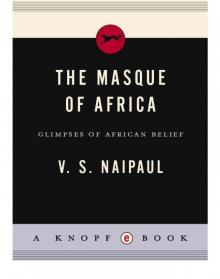 The Masque of Africa: Glimpses of African Belief
The Masque of Africa: Glimpses of African Belief A Turn in the South
A Turn in the South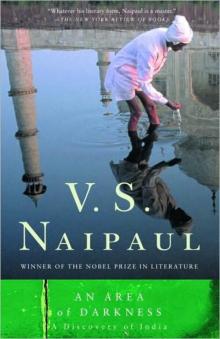 An Area of Darkness
An Area of Darkness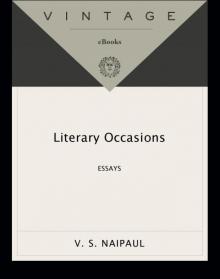 Literary Occasions: Essays
Literary Occasions: Essays A Way in the World
A Way in the World Among the Believers: An Islamic Journey
Among the Believers: An Islamic Journey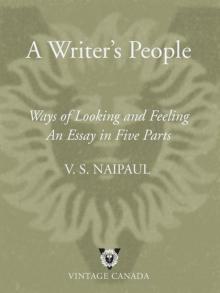 A Writer's People: Ways of Looking and Feeling
A Writer's People: Ways of Looking and Feeling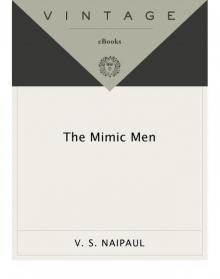 The Mimic Men: A Novel
The Mimic Men: A Novel Collected Short Fiction
Collected Short Fiction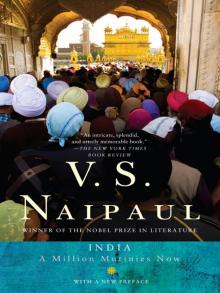 India: A Million Mutinies Now
India: A Million Mutinies Now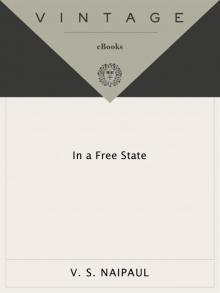 In a Free State
In a Free State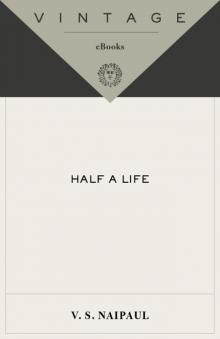 Half a Life
Half a Life Beyond Belief: Islamic Excursions Among the Converted Peoples
Beyond Belief: Islamic Excursions Among the Converted Peoples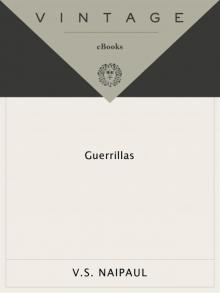 Guerrillas
Guerrillas A House for Mr. Biswas
A House for Mr. Biswas The Writer and the World: Essays
The Writer and the World: Essays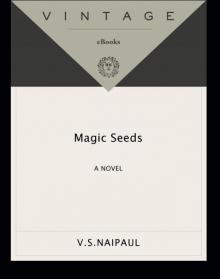 Magic Seeds
Magic Seeds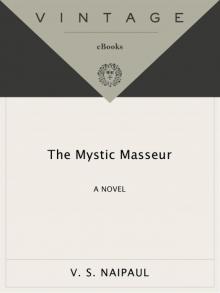 The Mystic Masseur
The Mystic Masseur Miguel Street
Miguel Street The Return of Eva Perón, With the Killings in Trinidad
The Return of Eva Perón, With the Killings in Trinidad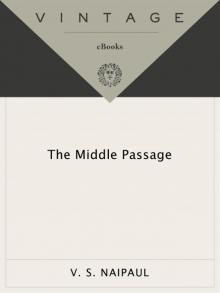 The Middle Passage
The Middle Passage A Bend in the River
A Bend in the River A Turn in the South (Vintage International)
A Turn in the South (Vintage International) Among the Believers
Among the Believers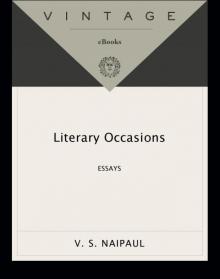 Literary Occasions
Literary Occasions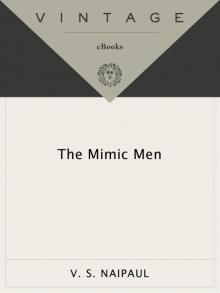 The Mimic Men
The Mimic Men The Writer and the World
The Writer and the World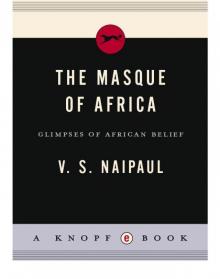 The Masque of Africa
The Masque of Africa